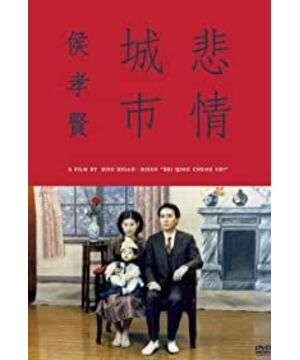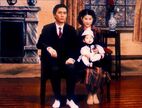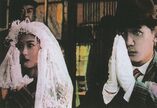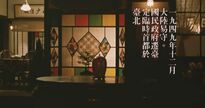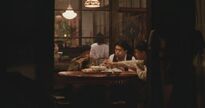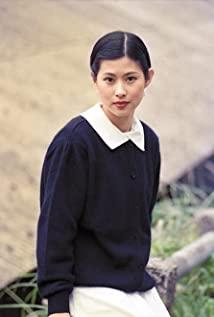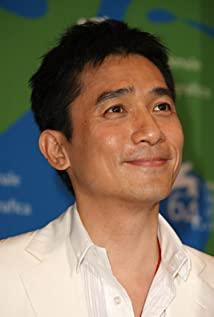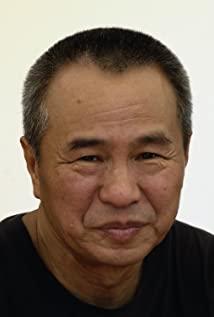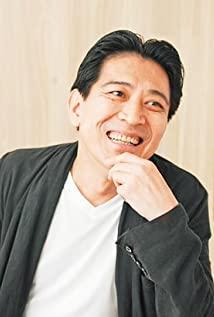night wind blowing under shady Keelung, the years turned up waves beat city under the moon. A woman is giving birth, and a lamp hangs in the hut, lighting up the dim yellow anxiety of the family.
This is Taiwan in 1945. The creaking radio broadcasts the news of Japan's total surrender, and women's moans can be heard from the house from time to time. The dimly lit hut is like a boat in the sea, drifting the family's decades of turbulent years.
Before long, a cry suddenly cut through the darkness, and a baby was born. The child is a boy, whose father Lin Wenxiong named Guangming.
The night is still cold, and the sky may be getting brighter. The child was still crying from time to time, the ink outside the window faded a little, and it soon returned to silence.
This moment is the beginning of a family tragedy. With the birth of the baby, there is also a story we are about to tell. The storyteller is called Hou Hsiao-hsien.
I watched this movie for the first time when I was in middle school, and I never dared to mention it, and I couldn't really understand it. I often think of some plots and dialogues in my mind, and what I realize is a poetic lyricism and a sense of ups and downs. As I get older, I can judge the endless sadness, as well as the eloquent narration of current events and interpretation of life. There are not many lines in this movie, but everything I want to say is outside the screen.
What floats and sinks in the vast sea is the wandering Taiwan, the turbulent island is Keelung with constant nostalgia, and the ordinary Lin family lives in the sad city. The film is based on the Lin family, connecting a period of history between Taiwan's recovery in 1945 and the relocation of the Nationalist government to Taiwan in 1949.
In 1945, Japan surrendered and Taiwan recovered. On October 25, the Nationalist government sent Chief Executive Chen Yi to take over Taiwan, announcing that Taiwan would rejoin China. However, the lives of the people on the island of Taiwan have not changed a day due to the change of regime.
The sun flag fell, the blue sky and white sun flag rose; intellectuals sang the "Trilogy in Exile" generously, and the old Japanese folk songs still melodiously rang in the children's ears; the radio was playing the news of Taiwan's recovery, wide and beautiful but warm tears. Send a Japanese woman Shizuko; the ruler has changed the national government, but the corruption and chaos are even worse than before, just like Lin Wenxiong shouted injustice in the film: "We are the most pitiful people on this island, let's go to the Japanese, let's go to the Chinese, everyone eats, everyone rides, No one hurts." At the February 28 Incident, such a contradiction eventually broke out.
On February 27, 1947, a staff member of the Taiwan Monopoly Bureau of the Nationalist Government injured and injured Lin Jiangmai, a female cigarette dealer, during an anti-smuggling activity, and then accidentally killed a passerby, Chen Wenxi. On the 28th, Taiwanese citizens held a demonstration demanding severe punishment of the murderer, but they were shot. The people became more and more angry, and the conflict spread all over Taiwan within a few days. The Kuomintang mobilized a large number of troops to suppress it, and the casualties were estimated to be nearly 1,000 to tens of thousands. History is known as the "228" event.
National hatred and family hatred, nostalgia and cynicism, warmth and indifference are intertwined in such a complex way. People also speak Taiwanese, Japanese, Shanghai dialect, hate killing or meet and love each other. This is the background of the film era.
Just as the movie begins with the birth of a baby, who was born in the dark and named Guangming, but was delivered by a Japanese woman, the fate of the child's life is also difficult to match. Director Hou Hsiao-hsien tells a folk epic beyond the macro perspective. Under the historical ring, there is the poetic youth of a generation that has passed away, the ordinary life blown by gunpowder smoke, and the constant coolness of autumn when Hu Qin pulls.
The
four sons of the Erlin family. The eldest son, Lin Wenxiong, presides over family affairs and runs a restaurant. There is a daughter named A Xue, and a son named Guangming. Wen Xiong was involved in the fight between his third brother and the gang, and eventually died in the casino.
The second son, Vincent, originally ran a small clinic, but was recruited by the Japanese to become a military doctor in Nanyang during the war. He kept his wife at home and waited for many years. Since then, there has been no news and nowhere to go.
The third son, Wenliang, was conscripted to Shanghai during the war and served as an interpreter for the Japanese army. When he returned from the escape, he lost his mind. After he recovered, he fought with gangsters, was framed and taken to prison. Tortured in prison, after being rescued, his madness relapsed and he became a cripple.
The fourth son Wenqing, deaf and mute since childhood, runs a photo studio in the town. Wen Qing became friends with elementary school teacher Kuan Rong, and later met his sister Kuan Mei. The two fell in love with each other in silence and became husband and wife. Wen Qing, Kuan Rong, etc. were all progressives, and they jointly engaged in revolutionary activities after the February 28 Incident. After Kuanrong was killed, Wen Qing was arrested and died in prison. Leaving Kuanmei alone and raising the baby Ah Qian...
Screenwriter Zhu Tianwen once talked about the beginning and end of Wenqing's role. At first they assumed that he could speak, but they didn't know how to proceed. Tony Leung's Mandarin Not very good. During the one-day conversation, Hou Hsiao-hsien suddenly said that it is better to let Wen Qing be dumb! So Lin Wenqing has become such a silent character as he is today. Now that I think about it, although this design was a little helpless at the beginning, it became a wonderful pen, giving birth to the benefits of inadvertently inserting willows.
When too many words are hidden in the heart, the most gorgeous expression is silence. The world cannot be said, and everything is said. The three-hour film poured ink out of memories that could not be dried for decades, wrote inexhaustible family hatred and hatred, and inexhaustible ups and downs in troubled times. Wen Qing is a blank space on this ink painting. The silent Wenqing is an observer of the fate of himself and others; Wenqing's silence is a desolation and quietness of life.
Wenqing communicated with people and often wrote with pen and paper. This was the case when Wen Qing and Kuan Mei met. The dialogue turned into simple and beautiful handwriting on paper, and turned into black and white silent film-like subtitles on the screen, which made the film have a poetic quality of words, and the conversation between the two was like a trickle of water. What remains is the openness of kindness in the heart, which is in common with the depths of human nature.
For example, talking about Wenqing’s childhood deafness, talking about the legend of the beautiful banshee on the Rhine, such as seeing the poems left by a deceased friend, and telling the story stroke by stroke: During the Meiji period, a Japanese girl was in full bloom when the cherry blossoms were in full bloom. Jump down. She is not tired of the world, nor is she despondent, she is facing such a splendid youth, afraid that once it disappears, she does not know what to do. It is better to be like cherry blossoms, when life is most beautiful, leave the branches with the wind. Her suicide note inspired all the young people at that time. It was the era of the Meiji Restoration, full of enthusiasm and spirit...
At this time, Wen Qing and Kuan Mei looked at each other, Jing Mei was speechless, and the subtitles were displayed again. The same verse: "Same luck / Cherry blossoms / Go flying / I will come later / Everyone is the same."
As at the beginning, the two met in the green show in the Jiufen Mountains, such as Daiyuan Mountain, fleeting years like water, although I don't know what kind of tragic years will be experienced in the future, but the one who blows on the face at this moment is the one who smiles and remembers for a lifetime. Youth Shaohua.
San
Wenqing is not without a line. Someone on the train wanted to arrest him and asked him what he was doing. With panic in his eyes, he struggled hoarsely to say three words: Taiwan-Taiwan-people! People didn't hear him clearly, so they raised a stick to hit him, but luckily they rushed over Arrived, shouting at the thug, he is dumb, don't you know? The thugs left in dismay.
In such a chaotic world, even the dumb are forced to speak. Later, when Wen Qing was arrested and killed, the absurdity and sadness in it became more and more pervasive, so that people could comment on the silence.
However, Wen Qing, who is deaf and mute, has always stood on the edge of chaotic current affairs. The most direct expression of the chaotic situation in Taiwan is the eldest son Wenxiong and the third son Wenliang. The tragedy of the two is the victim of the battle between bureaucrats and gangs, and it is also a burial of social unrest.
Wenliang is a leaf boat engulfed in troubled times. In order to pursue his own selfish desires, he got involved in the underworld, stole Japanese money, and smuggled drugs.
In order to prevent his brother from trafficking drugs, his elder brother Wenxiong was involved in the gang fight. First, the drugs smuggled by Wenliang were confiscated, and then he asked Chayan and the family to be safe with the gang. Finally, because they blocked the gang's fortune, the two brothers were framed and wanted for traitor. After a lot of hard work, although he rescued his younger brother, he has become a crippled person. Wen Xiong himself eventually fought at night in the casino and died at the hands of the gang. The eldest brother, who shoulders the heavy burden of the family, collapsed like this, and the pain of a nation is reflected in the pool of blood.
The four sons of the family, Wenxiong Wenliang's vein, is focused on world affairs, and the surging waves are surging; Wensen Wenqing's vein is the sky is high and the clouds are clear, and the still water is deep. However, Wen Xiong was killed, Wen Liang went mad, Wen Sen disappeared, and Wen Qing was arrested. A family of four sons can't escape the ruins of the family.
If you look for an answer in history, you can see that in that era, the bloodstains between Taiwanese natives and outsiders are still there. The isolated island of Taiwan has been drifting for decades, but after the liberation, life has become more dire. Speculators from outside came to the island to seek a profit, and formed cliques to act indiscriminately. The Kuomintang from outside wanted to say they were traitors, but the Shanghai Gang from outside thought they were blocking their way of making money. This province and other provinces, the same clan cannibalism.
They are struggling to find a recognition of their identity, hesitating in the changes of fate and mute in the changes of language. Is it Japanese, Chinese, or Taiwanese? What is the motherland, and where is the motherland? The world has changed several times, but it is still struggling to survive in the blood and rain; the homeland is elusive and hard to find, where will the people on this land go? The pursuit of the motherland, the statement of history, the recollection of the family, and the consideration of human nature, the language of the film is always sketchy and calm, but it is indifferent and vast clouds of smoke, condensing is not forgotten for a long time. forever hurt.
In the movie, Tolerance, Wenqing and others meet again after a long absence, and have a chat and drink in a restaurant. When talking about the confusion, one person sang in a low voice: "My home is on the Songhua River in the northeast, where there are forests and coal mines, and there are soybeans and sorghums all over the mountains..." Everyone reconciled, the singing gradually began, and for a while, they lingered over the small town. But where is home, where is home? Only the drizzle was misty and lingering for a long time.
Four
Hou Hsiao-hsien talked about this film, and once said that what he hoped to make was the activities of people under the laws of nature. So under his long shots, birth, death, gathering and parting are like watching flowers from across the bank. Whenever there is a conflict in the plot, someone is fighting or crying, the camera will turn to the distant mountains of Jiufen, a vast sea of clouds. The mountain road is filled with lingering light smoke, and the peaceful narrative conceals the undercurrent of the undercurrent. Hou Hsiao-hsien's long shot is like this, calm and indifferent, slow and motionless, free to imagine, as a time traveler, going back all the way from the river of life, looking for a self-examination of the heart.
The calmness of this shot makes people feel cold and alienated, and what gives this desolate warmth and hope is the quiet narration that runs through the beauty.
"On the eighth day of the first month of November in the 20th year of the Showa era, it was a good day and there was a cloud. With a letter of introduction written by my father, I went up the mountain to work at the Miners' Hospital in Jinguashi. My brother was not free to teach, so he asked his good friend Wen Qing to come and pick me up. There is the coolness of autumn, and the scenery along the road is very good, and I feel happy when I think that I can see such beautiful scenery every day in the future." The
diary-style narration sounded in Jiufen's cloudy and warm day, indifferently analyzing the context of an era at the same time , but also warm into a woman's kind and undisputed heart. Since then, the rise and fall of a family has unfolded in this whisper. At this moment, it is the first time in life like hot spring water.
However, when the cherry blossoms leave their branches with the wind after the rain, this encounter is also transformed into mutual support in the wind and rain. Passing through the dark prison cell and witnessing the blood of the victims, the silent Wen Qing consciously embarked on the road of resistance; and after crying, passing through life and separation, and suffering through death, the graceful beauty of the past has become virtuous and stoic. woman.
The eldest Wenxiong has died tragically, the third Wenliang has gone mad, and a family has fallen apart, but what remains in memory is the most painful peace. In the hospital, Kuan Mei gave birth to a son, and the camera turned to the Cangxiu mountains and seas in Jiufen again. Outside the camera was Kuan Mei's quiet monologue: "This afternoon, I heard the first spring thunder in the new year, and the momentum was very loud, and it was like a burst of thunder. I want to wake up the mountains and the sea."
Even if life is painful and life doesn't know where to go, life after rain is still meaningful.
At the end of the story, the family of three stood by the train station with the child in his arms, looking at the coastline in the gray rain outside the fence, wondering where they could escape. The dignity, forbearance and tolerance of this life still allowed them to return to their homes. They came to the scene where the curtains, fireplace and vases were painted, adjusted the camera, and took the last family photo of the three of them in full costumes.
Later, Wenqing had been captured, and the people who remained were still living peacefully. Kuan Mei picked up the pen and started writing a letter to A Xue.
"A modest has teeth, and laughed and looked very good, much like the eye tetra. Free to walk home, nine began to turn cold, Mountain blossoms. Misty mountain white as snow."
Shallow In a whisper, it makes people sigh.
Hou Hsiao-hsien once said: "I think one day the film should be made like this: plain, very simple, and everyone can see it. But those who see deeply can see deeply, very deeply."
View more about A City of Sadness reviews


